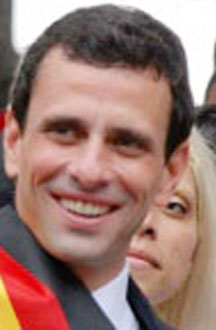CARACAS, (Reuters) – Venezuela’s presidential vote will be held on Oct. 7 next year when socialist leader Hugo Chavez hopes to win re-election and prolong his self-styled “revolution” in South America’s largest oil exporting country.

Yesterday’s announcement starts what is expected to be a close race between Chavez, who is being treated for cancer, and an opposition candidate to be picked in a February primary.
The charismatic but authoritarian Chavez, 57, has dominated Venezuela since 1999, thrilling supporters in shanty-town strongholds but alienating many others with his blunt rhetoric, tough treatment of critics and sweeping nationalizations.
The man who has become Washington’s main irritant in Latin America — a mantle inherited from Cuba’s Fidel Castro — wants to rule for at least two more six-year terms until 2025.
“Onward everyone with Chavez to victory in 2012!” said his Information Minister Andres Izarra after the National Election Board’s announcement of the date ended months of uncertainty.
The opposition has scheduled its primary election for Feb. 12 next year, with the youthful governor of Miranda state, Henrique Capriles Radonski, 39, favoured to win.
He will be challenged by fellow opposition Governor Pablo Perez of Zulia state and others.
The October date gives the opposition plenty of time to run a campaign and also leaves Chavez more than a year to get his health back on track. He underwent cancer surgery in June and is due to start a fourth round of chemotherapy within days.
Chavez hopes his popularity among the poor, due to both his folksy style and heavy spending of the OPEC member’s oil revenues on schools, clinics and other services in poor areas, will again carry the day.
The opposition says Venezuelans are tired of what they see as Chavez’s mismanagement of the economy and dictatorial style. Crime, failing electricity and high prices are among the main concerns of the nation’s 29 million people, polls show.
Opposition leaders, who had feared the election may be brought even further forward to try and wrongfoot them, expressed satisfaction.
“It’s more than sufficient for an election campaign,” one of them, Henry Ramos Allup, told reporters.
“President Chavez will lose the elections in October … he’ll have to hand over the presidency in January (2013).”
“CONSTRUCTIVE NEWS”
Boris Segura, senior economist at Nomura International Securities in New York, said authorities had chosen a sensible date, even though they had brought it forward from December when Venezuela traditionally holds presidential votes.
“This is very constructive news, in that it provides the opposition with enough time to campaign after it chooses its candidate in February,” he said.
“The announcement reduces political uncertainty, improves the opposition’s chances of success and thus bodes well for improving Venezuela’s credit profile,” Segura said.
Venezuela sovereign bonds, considered by far the riskiest debt instruments tracked by the JP Morgan Emerging Markets Bond Index Plus, outperformed on Tuesday.
